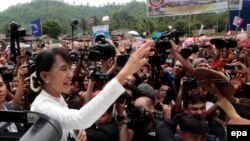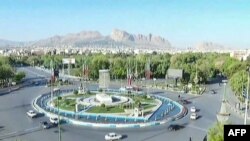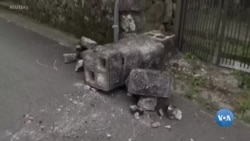ບັນດານັກຂ່າວທີ່ພະຍາຍາມທີ່ຈະເຮັດຂ່າວໃນສັບປະດານີ້ກ່ຽວກັບການໄປຢ້ຽມຢາມປະເທດໄທເປັນເວລາ 3 ມື້ ຂອງຜູ້ນຳຂອງມຽນມາ ທ່ານນາງ Aung San Suu Kyi ຊຶ່ງຈະພາໃຫ້ພວກເຂົາເຈົ້າປະເຊີນກັບຂໍ້ຈຳກັດຮັດແຄບທີ່ບໍ່ປົກກະຕິທຳມະດາທົ່ວໄປ.
ນີ້ແມ່ນການມາຢ້ຽມຢາມໃນລະດັບສູງຂອງມຽນມາ ມີຂຶ້ນໃນຂະນະທີ່ມຽນມາພວມຫັນປ່ຽນ ຈາກການປົກຄອງທາງທະຫານໄປສູ່ການປົກຄອງແບບປະຊາທິປະໄຕ ໃນຂະນະທີ່ການຄັດຄ້ານໄດ້ມີຂຶ້ນໃນໄທ ຊຶ່ງເປັນປະເທດເພື່ອນບ້ານ.
ແຮງງານຊາວມຽນມາ ໃນລະຫວ່າງ 1 ລ້ານ 4 ແສນ ຫາ 4 ລ້ານຄົນ ໄດ້ປະກອບອາຊີບທີ່ ປະເທດໄທ ຊຶ່ງສ່ວນໃຫຍ່ແລ້ວນັ້ນ ອາດແມ່ນແຮງງານ ທີ່ຜິດກົດໝາຍ.
ພວກນັກຂ່າວໄດ້ຖືກເຕືອນມາແລ້ວວ່າ ຈະບໍ່ມີໂອກາດໄດ້ຖາມຄຳຖາມທ່ານນາງ Aung San Suu Kyi ເຖິງແມ່ນວ່າໃນທ່າມການຂອງອັນທີ່ເອີ້ນວ່າ ກອງປະຊຸມຖະແຫລງຂ່າວ ຮ່ວມ ໃນບາງກອກ ກັບນາຍົກລັດຖະມົນຕີໄທ ທ່ານ ປຣະຍຸດ ຈັນໂອຊາ ຊຶ່ງເຂົ້າກຳອຳ ນາດໂດຍການກໍ່ລັດຖະປະຫານທີ່ບໍ່ນອງເລືອດ ເມື່ອ 2 ປີກ່ອນໜ້ານີ້ ກໍຕາມ.
ກະຊວງການຕ່າງປະເທດຂອງໄທ ມີໝາຍກຳໜົດທີ່ຈະສົ່ງພວກກ່ຽວຂ້ອງຮວມທັງຊ່າງກ້ອງ ຊ່າງວີດີໂອ ແລະພວກນັກຂ່າວ ໃນການເກັບກຳຂ່າວຂອງການມາຢ້ຽມຢາມໂດຍຜູ້ທີ່ໄດ້ຮັບລາງວັນ Nobel ຂະແໜງສັນຕິພາບ ທ່ານນາງ Aung San Suu Kyi ນັ້ນໃຫ້ແຕ່ງກາຍ ສຸພາບຢ່າງເປັນທາງການ ໃນຕະຫຼອດເວລາ ຊຶ່ງຮວມທັງໝາຍກຳໜົດທີ່ຈະຢ້ຽມຢາມ
ສູນອົບພະຍົບໃນເຂດຊາຍແດນໃນວັນເສົາທີ່ຈະມາເຖິງນີ້ ຜ່ານຖະນົນຫີນໜາມໜໍ່ທີ່ບໍ່ປູຢາງນັ້ນ.
ພວກນັກຂ່າວສ່ວນໃຫຍ່ ເຖິງແມ່ນວ່າພວກເຂົາເຈົ້າຈະປາກົດຕົວໃນຊຸດສາກົນທີ່ເສື້ອຊຸດ ຍາວ ກໍຕາມ ພວກເຂົາເຈົ້າຈະບໍ່ໄດ້ອະນຸຍາດ ໃຫ້ເຂົ້າພົບຜູ້ນຳຂອງມຽນມາ ໃນສູນອົບພະຍົບ Tham Hin ຊຶ່ງການເກັບກຳຂ່າວນີ້ ໄດ້ຈຳກັດຮັດແຄບໃຫ້ແກ່ “ສື່ຂອງທາງການແລະຜູ້ຕາງໜ້າສື່ມວນຊົນ ເທົ່ານັ້ນ.”
It is a high profile visit that comes as Myanmar, also known as Burma, transitions from military rule to democracy, while the opposite has occurred in neighboring Thailand.
Between 1.4 million and four million citizens of Myanmar work in Thailand, perhaps the majority of them illegally.
Reporters are being told they will have no opportunity to question Aung San Suu Kyi, even during a so-called joint news conference in Bangkok with Prime Minister Prayuth Chan-ocha, who seized power in a bloodless coup two years ago.
Thailand's ministry of foreign affairs, in an agenda sent to correspondents, also advised photographers, videographers and reporters covering the Nobel Peace Prize laureate's visit to be formally attired "at all times" including during her scheduled visit Saturday to a border refugee camp reachable via unpaved roads.
Most journalists, even if they show up in a tuxedo or ball gown, will not be permitted to see the Myanmar leader at the Tham Hin refugee camp as coverage has been additionally limited to "official media and pool media only."
Aung San Suu Kyi's arrival Thursday and Saturday departure at Suvarnabhumi Airport will also be restricted "pool coverage" with only two representatives of the international media allowed to attend.
Aung San Suu Kyi's visit with 3,000 Myanmar migrants workers at Thailand's largest seafood market Thursday and a speech the following day at Thailand's Foreign Ministry, are "open to all media," although videographers are complaining about strict security measures forbidding them from carrying backpacks.
Two international video news agencies requested reconsideration of that restriction, noting crews on the move need to carry spare batteries, cables, microphones and other equipment in backpacks.
Thai MFA information department second secretary Jatupon Innachit, responding to complaints from the international media, expressed understanding, but said the restrictions are "the instructions we have received" although he declined to say from whom.
The new Myanmar government, led by Aung San Suu Kyi's National League for Democracy, has been criticized for limiting media access since it took power in April, following last year's landslide election victory.
Aung San Suu Kyi, who holds the titles of state counsellor and foreign minister, was barred from becoming president according to the constitution enacted by the previous military government.
President Htin Kyaw, a mostly out-of-sight figurehead, is not accompanying her to Thailand.
Myanmar's information minister, Pe Myint, last week promised reporters they would soon have more access to government ministers and acknowledged a lack of transparency.
Reporters in Naypyitaw on Monday were barred from covering a birthday celebration for Aung San Suu Kyi, who has openly demonstrated irritation with the media.
She has also been defensive about international media reports that her government is ignoring the plight of the minority Rohingya.
In a meeting Monday with U.N. special investigator Yanghee Lee the foreign minister reiterated Myanmar will continue to refrain from using the word "Rohingya," according to foreign ministry permanent secretary Aung Lin.
Many in Myanmar's dominant Buddhist community regard the Muslim Rohingya as illegal immigrants from Bangladesh.
Questions about the Rohingya would almost certainly be directed at Aung San Suu Kyi at Friday's scheduled joint news conference with the Thai prime minister, an uncomfortable situation it appears the two neighbors have now found a way to avoid.










